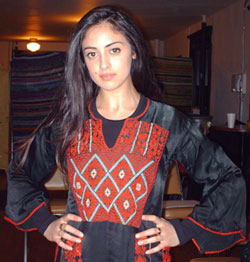Sister soldier tells story of struggle through song
By | Last updated: May 18, 2009 - 12:18:31 AMWhat's your opinion on this article?

Shadia Mansour
‘Hip Hop started in the heart, in the streets of the Bronx and it came from the struggle. Arabic hip-hop, it doesn't take anything away from that. It goes back to the purpose of Hip Hop and it comes from the struggle.’ |
The Final Call (FC): Tell us a little bit about yourself, and how you got started in hip hop?
Shadia Mansour (SM): Well I am Palestinian born and raised in London and I got into Arabic hip-hop through a group in Holland called Arap. I joined the group as the only female as a classical Arabic singer and I just combined and basically bridged the gap between hip hop lyrics and traditional singing and that is what I do today, traditional Arabic hip hop, that's me.
FC: How is it for you being a female and a Palestinian in the world of hip hop?
SM: I am a big feminist, I represent women from all over not just as a Palestinian representative, but Arabic women. I represent strong women of the world, meaning women of Africa, women of the Middle East, women of South America, women all over the world. I stand up for the rights of women, if (other) people have a problem with it, that is there problem. I know the women are under a lot of pressure in hip-hop and that is what inspired me to do even more. It is not enough women in Arabic hip hop.
FC: Who are some of the females in the industry that you look up to?
SM: Lauryn Hill is number one. MC Lyte, Da Brat at one point really inspired me. I will have to say these are my top three.
FC: What do you see as the connection between hip hop in the U.S. and Arabic hip hop?
SM: Hip Hop started in the heart, in the streets of the Bronx and it came from the struggle. Arabic hip-hop, it doesn't take anything away from that. It goes back to the purpose of Hip Hop and it comes from the struggle. Just like Martin Luther King said, injustice here is like injustice everywhere in the world. So we say it is struggle in Palestine, struggle in Africa, struggle in South America or anywhere else in the world. So I say Hip Hop is a tool that we use just in a different language and, to be honest, I call Palestinian Hip Hop the new intifada, the new uprising.
FC: What are your future plans; what do you have going on?
SM: Well check me out on myspace.com/shadiamusic and I'm basically working on a mixtape, on an album and by the summer we will have something out. Keep your eyes and ears open.
FC: Okay. We will.
SM: Thank you.
INSIDE STORIES AND REVIEWS
-
-
About Harriett ... and the Negro Hollywood Road Show
By Rabiah Muhammad, Guest Columnist » Full Story -
Skepticism greets Jay-Z, NFL talk of inspiring change
By Bryan 18X Crawford and Richard B. Muhammad The Final Call Newspaper @TheFinalCall » Full Story -
The painful problem of Black girls and suicide
By Charlene Muhammad -National Correspondent- » Full Story -
Exploitation of Innocence - Report: Perceptions, policies hurting Black girls
By Charlene Muhammad -National Correspondent- » Full Story -
Big Ballin: Big ideas fuel a father’s Big Baller Brand and brash business sense
By Bryan Crawford -Contributing Writer- » Full Story






 Click Here Stay Connected!
Click Here Stay Connected!








